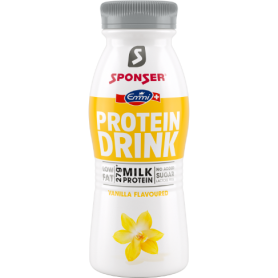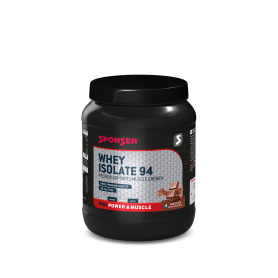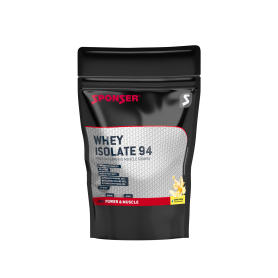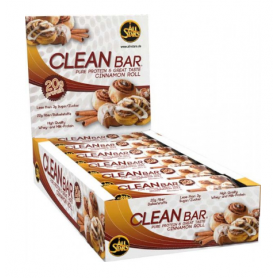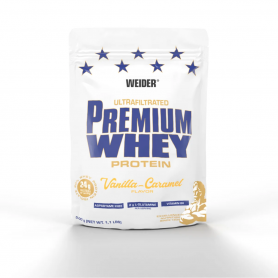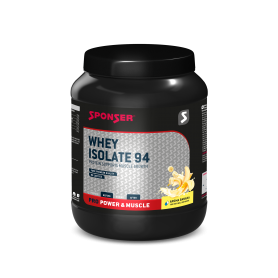
Muscle building
There are 194 products.
Sponser Protein Drink 8 x 330ml PET
PROTEIN DRINK is a food supplement based on whey protein (strawberry-cranberry) or milk protein (vanilla). A protein-rich diet supports the development and maintenance of muscle mass.
CHF 25.20
CHF 28.00
Sponser Whey Isolate 94 in 425g can
Whey Protein 94 becomes Whey Isolate 94 with the same composition. Sponser Whey Isolate 94 is a rapidly available whey protein isolate from Cross Flow Microfiltration for building and maintaining muscle mass.
CHF 28.80
CHF 32.00
Sponser Liquid Energy 20 x 70g
Liquid energy concentrate from Sponser made from fast and slow metabolizable carbohydrates, sodium and potassium.
CHF 57.60
CHF 64.00
Sponser Long Energy Competition Formula 1200g can
LONG ENERGY by SPONSER supports long-term endurance thanks to a high proportion of long-chain, complex carbohydrates. The carbohydrates stabilise the blood sugar level, prevent performance slumps and the endurance performance is thus maintained/improved.
CHF 42.30
CHF 47.00
Sponser Maltodextrin 100
Maltodextrin is a tasteless carbohydrate powder for enriching drinks with energy
CHF 15.75
CHF 17.50
Sponser Carbo Loader 1200g can
For the replenishment of carbohydrate stores developed, energy sports drink. Also shortens the recovery time during training camps.
CHF 27.00
CHF 30.00
Sponser Creatine Monohydrate 500g can
Pure creatine for muscle building, strength, interval and sprint sports.
CHF 33.75
CHF 37.50
Sponser Whey Isolate 94 in 1500g bag
Rapidly available whey protein isolate from cross flow microfiltration with a similar amino acid composition to the body's own muscle protein. For building and maintaining muscle mass.
CHF 72.00
CHF 80.00
Sponser Power Pro Amino 12500 Ampoules 30 x 25ml
Sponser Power Pro Amino 12500 is a liquid whey protein hydrolisate with rapidly available peptides for muscle building and recovery.
CHF 72.90
CHF 81.00
All Stars Intensity NO-X 640g can
Sensational performance increases with Intensity NO-X from All Stars.
CHF 56.61
CHF 62.90
All Stars Clean Bar 18 x 60g
The new 60g All Stars Clean Bar convinces with sensational nutritional values.
CHF 64.80
CHF 72.00
All Stars Speed Attack 24 x 60ml
Speed Attack by All Stars - the highly effective energy booster.
CHF 73.44
CHF 81.60
Weider Maximum Krea-Genic Capsules 200 capsules
Weider Maximum Krea-Genic - extremely high-dose creatine capsules to increase energy during intensive training, especially for muscle and strength building.
CHF 57.60
CHF 64.00
myline protein 400g can
The 80% protein with L-carnitine + baking recipe booklet in each can. Ideal for preparing delicious shakes, low-fat desserts and cakes.
CHF 26.55
CHF 29.50
Weider Premium Whey Protein 500g bag
Ultrafiltered whey protein concentrate plus whey protein hydrolyzate (contains fast peptides) plus L-glutamine.
CHF 26.10
CHF 29.00
Sponser Recovery Drink 20 x 60g sachets
SPONSER Recovery Drink is a lactose-free recovery drink for accelerated glycogen storage, protein synthesis and strengthening of the immune system.
CHF 63.00
CHF 70.00
Sponser Whey Isolate 94 in 5kg bucket
Whey Protein 94 becomes Whey Isolate 94 with the same composition.Sponser Whey Protein is a rapidly available whey protein isolate from Cross Flow Microfiltration for building and maintaining muscle mass .
CHF 252.00
CHF 280.00
Sponser Whey Isolate 94 in 850g can
Whey Protein 94 becomes Whey Isolate 94 with the same composition. Sponser Whey Isolate 94 is a rapidly available whey protein isolate from Cross Flow Microfiltration for building and maintaining muscle mass.
CHF 47.70
CHF 53.00
Sponser Recovery Shake 900g can
The Recovery Shake from Sponser is a combination of whey protein, carbohydrates and casein for optimal recovery and muscle mass building.
CHF 29.70
CHF 33.00
Weider Gold Whey Protein 2kg bag
Weider Gold Whey - pure whey concentrate to cover the protein requirement after training.
CHF 76.50
CHF 85.00
Sponser Red Power Gums 20 x 75g
Handy snacks for more performance during training and competitions. The Red Power Gums are particularly suitable during energy shortages.
CHF 57.60
CHF 64.00
Weider Gold Whey Protein 500g bag
Weider Gold Whey - pure whey concentrate to cover your protein needs after training. Available in 4 delicious flavors.
CHF 21.60
CHF 24.00
Sponser Liquid Energy BCAA 20 x 70g
Best-tolerated liquid energy concentrate made from fast- and slow-absorbing carbohydrates. Enriched with BCAA. Ideal for long-term endurance training.
CHF 57.60
CHF 64.00
Weider Protein 80+ 2kg bag
Protein 80 Plus in a 2kg bag to supply the trained muscles with high-quality protein. Available in 7 delicious flavors.
CHF 85.50
CHF 95.00








